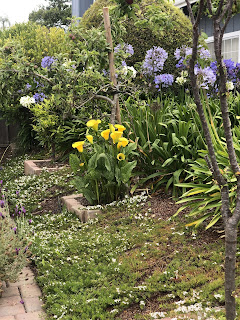We live in a
time when telling the truth seems to be under assault in so many corners of our
society. Speaking the truth, especially
“speaking truth to power,” as the saying goes, can be dangerous.
People wanted
to kill Jeremiah for speaking the truth to powerful leaders of Israel; “This
man deserves death; he has prophesied against this city, as you have heard with
your own ears.” The threat didn’t silence Jeremiah. He was fortified by the realization that what
he said to his people was a message from God, even if the cost of delivering it
was the loss of his own life. (Jeremiah
26:11-24)
John the
Baptist spoke out against the excesses of Herod Antipas’ court, particularly
his incestuous marriage with Herodias. In
one of the most infamous stories in the gospels, Herod is infatuated by the
dance of Salome, the daughter of Herodias.
The drunken king, overly lavish and vain in his promise to give her whatever
she desires, falls into the malicious trap of Herodias who prompts her daughter
to ask for the head of John the Baptist on a platter. (Matthew 14:1-12)
This sad
incident illustrates the power of anger in its most extreme form. When anger brews and grows it causes deep
passion, so much so that it clouds a person’s thinking and reason. Hate and revenge can consume a person and
lead to complete foolishness.
Herod was a
witness of extreme irrationality. He was
pressured to do what he didn’t want to do because he was afraid of doing the
right thing. He was overwhelmed by the
hate in the heart of Herodias and, as a result, gave in to the execution of
John whom he actually appeared to like and enjoyed listening to.
Normally we
seek to be inspired by the good example of others. But we can be also be “inspired” in a
different way. We can use the witness of John’s execution as
an opportunity to look at any struggles we have with anger, resentment, and
especially hate. Hate can sneak in and
cause much destruction in our lives and the lives of others.
Jesus, too, had
to endure His Passion and death for declaring the truth. Numerous passages in the New Testament show us
that powerful ruling elites conspired to take the life of the Son of God, and
succeeded—until His Resurrection, that is!
Most of us won’t
have a dramatic, public role as a prophet, such as Jeremiah, John the Baptist,
and Jesus Himself. But there are times
when we, too, must risk speaking the truth—and living the truth—when it may be
costly. Sometimes we have to use “tough
love” when someone we care for is making a serious mistake in their lives. Sometimes we have to speak up when innocent
people are being maligned. Sometimes we
have to shut down, rather than pass on, false and hurtful gossip. These, too, are prophetic moments that
require the courage and integrity of a prophet.



















